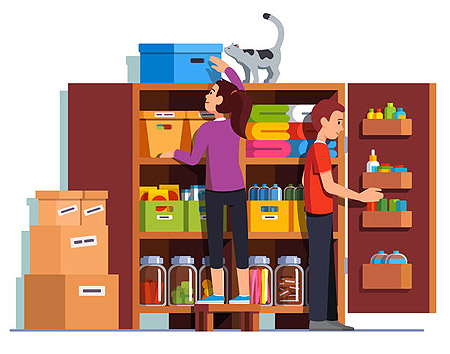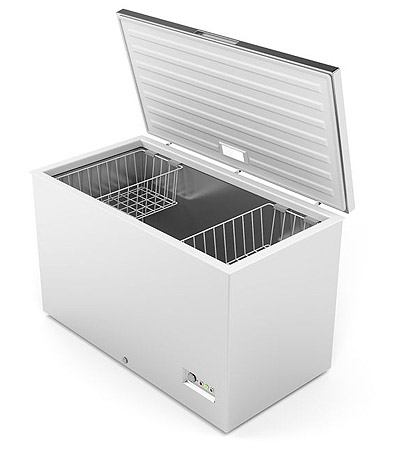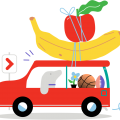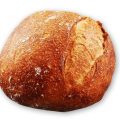
Making sure your pantry is fully stocked for an emergency is always a great idea. This is by no means, however, a recommendation to go to your local grocery store and start hoarding and stockpiling food during times of need. That was never the intention of the article in the first place, as it was started before COVID-19 took hold. Leave some food and supplies for your friends and neighbours if they aren’t necessities. Most stores have already imposed quantity restrictions anyway.
So is your pantry stocked and ready for a zombie apocalypse?
Just Stocking up? or been watching too many Episodes of Doomsday Preppers?
I’m sure many people have watched television shows where a family in rural America has purchased or built their own miniature underground nuclear fallout bunker. Packed to the brim with glass jars full of food, an imposing metal cabinet full of semi-automatic weapons and perhaps some gas masks – ready for a real-life walking situation to present itself.
Unfortunately, if that’s your end goal, this article may not help you to the extent you need. However, if you’re simply looking to build a reasonable stockpile of food and save money in the process, this is probably right up your alley.
Now it’s not the current global pandemic that got me reconsidering my shopping habits, but really just the annoyance of running out of things like spaghetti and then having to re-stock at full price (gasp)! Yes, I know you can wait a couple of weeks for a sale if you’re not desperate, but those of us with a spouse or kids may not always have that luxury. We can probably agree, a happy spouse trumps a $0.50 cent savings.
Would you rather Crave for a Week than Overpay?
So out of the necessity of not having a meltdown in the middle of the grocery store from having to buy a $2.00 bag of pasta when I can pay $0.79 cents, I decided to start doing more bulk buying. Non-perishable items like pasta sauce, cereals, canned vegetables and similar are all candidates for re-homing in my pantry.
Realistically when you think about the number of these items you purchase in a calendar year and then slash the cost in half, it can be huge savings. Not only that, but you can usually find great deals on such items, particularly at discount grocery chains, which might not deliver the most luxurious shopping experience, but for things like canned corn – does it really matter where you’re buying it? They all carry the major product lines.
In addition to the canned products, I also like to keep a bit of a stockpile of frozen fruits and vegetables as well. Frozen fruit can be great if you don’t want to pay out-of-season prices or worry about food waste, as a lot of these items found in the produce section deteriorate faster than you can eat them.
Frozen fruit can end up being a better deal just from factoring in the potential food waste if you have young kids. And I’m not saying don’t buy fresh stuff, but it’s nice to have some reserves for your bunker.
The Deep Freeze

I find using the same game plan as canned food with fresh or frozen meat really helps to save on costs. Having a large freezer and stocking items on sale like chicken breast, back ribs, bacon, whole turkeys (yes I do that and it’s wonderful) is a super way to save money. It also pays off handsomely when something like COVID-19 comes along and you’re stuck in your home for weeks at a time or simply don’t want to leave to go grocery shopping!
Now some people will argue that it’s cheaper to just go vegetarian and not buy meat period — true… but some of us like meat! Another argument might be the cost of running a second freezer all year. But realistically, modern appliances are so efficient – even more so if you keep it clean, and in a colder area of your house, like the basement or garage.
So yes, you can and will see big savings on your meat purchases if you watch for sales and do a little storage. Like seriously, why pay $8 for a pack of sliced turkey when you can buy the entire bird? Other non-meat products I like buying on sale and storing in the freezer are things like frozen orange juice, bread of all kinds, fish, lasagnas, pizza dough and french fries.
Also, make sure you utilize your cold cellar if you have one. You can store items such as potatoes, onions, carrots – basically a lot of ‘root’ vegetables. Fruits like apples and pears can also store well in your cold cellar.
Bonus Tip – If you live in a northern climate and like gardening, you can store tropical bulbs and roots in your cold cellar over the winter to re-plant in the late spring.
Non Food Items
Other supplies are of course a good idea to get on sale and store in reasonable quantities for the cost savings alone. Like toilet paper of course, as people are now desperate to obtain some during coronavirus lockdowns. Personally, I have enough to build a small children’s fortress and I don’t have to feel bad about it since I acquired it all pre-apocalypse. Best of all, I can share with any poor neighbours who run out and can’t acquire such essential quarantine items.
Other products like Kleenex, paper towels, soap, personal care products and cleaners are all good to stock in a closet or laundry room cupboard – although hardcore savers will debate if things like paper towels are necessary!
Bottled Water?

My advice is if you want to store some water – get a few of those 18-litre jugs, fill them from your taps and seal them up tightly. If you’re worried about the quality, just get a filtration pitcher for your fridge and transfer it when you decide to drink your emergency supply.
Watch Your Expiry Dates
One last thing to keep in mind when stockpiling is to be cognizant of items that have longer shelf lives but do go bad. Things like Kraft dinner, flour, cereal… many of these cheap staples will be “safe” to eat but won’t necessarily taste great anymore if they are stale. The same goes for freezer items. They are generally not recommended to be kept for over a year.
If your stockpiled items get too old, they’ll still save your life from a virus pandemic… or a zombie apocalypse.
They’ll probably just taste terrible.



